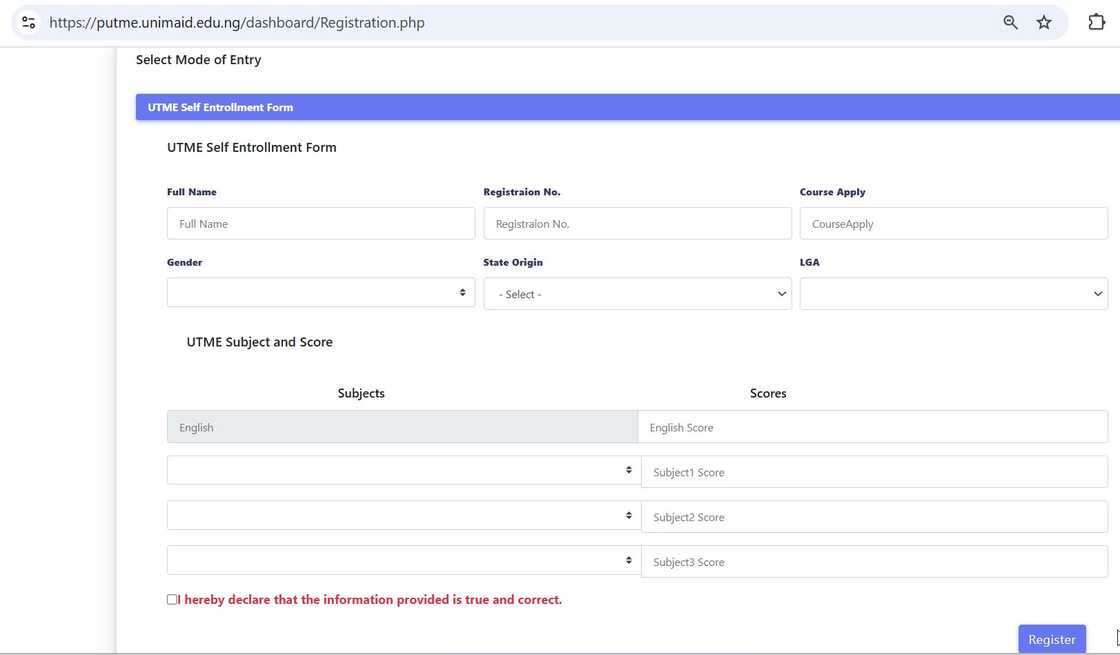UNIMAID cut-off mark and admission requirements for all courses
One key requirement for joining most Nigerian universities is attaining the cut-off mark. The Joint Admission and Matriculation Board (JAMB) sets a general cut-off for all universities, but there are varying departmental cut-off marks depending on the course. If you are considering joining the University of Maiduguri (UNIMAID), it is important to be familiar with the UNIMAID cut-off mark and other requirements.

Source: UGC
TABLE OF CONTENTS
- UNIMAID cut-off mark
- UNIMAID admission requirements
- UNIMAID admission application procedure
- What is the JAMB cut-off mark for UNIMAID?
- Does meeting the cut-off mark guarantee admission into UNIMAID?
- Can I change my course if my UTME score is below the cut-off for my chosen course?
- How does UNIMAID determine departmental cut-off marks?
- Does UNIMAID consider post-UTME scores?
- Can I gain admission to UNIMAID with a score below the cut-off mark?
- Does UNIMAID accept second-choice candidates?
- Can I change my course after admission?
UNIMAID, one of the most prestigious universities in Nigeria, attracts thousands of applicants annually. It boasts diverse academic programs and offers high-quality education. Attaining the UNIMAID cut-off mark is a critical requirement, but it varies by course. Understanding its admission requirements helps you to strategise and improve your admission chances.
UNIMAID cut-off mark
The UNIMAID cut-off mark is the lowest score potential students must attain in the Unified Tertiary Matriculation Examination (UTME) to be eligible for admission into the university. Like other higher learning institutions in Nigeria, UNIMAID has a cut-off mark of 160, as set by JAMB. However, specific courses have higher cut-off marks due to their competitiveness.
UNIMAID courses and cut-off marks
What is the UNIMAID cut-off mark for all courses? Although the general cut-off mark is 160, a prospective student must attain higher cut-off marks to be eligible for some highly competitive courses. Therefore, for a better chance of qualifying for a particular course, your score should be higher than 160. Below are cut-off marks for specific courses based on faculties.
| Faculty | Cut-off mark |
| Medicine and Surgery | 200 |
| Pharmacology | 190 |
| Law | 190 |
| Engineering | 180 |
| Nursing Science | 200 |
| Social Sciences | 160 |
| Education | 160 |
| Arts and Humanities | 160 |
Note that the cut-off mark varies every year depending on multiple factors. Some key factors determining a course’s cut-off mark include candidates' performance in the entrance examination, the number of applicants, and the school’s capacity to admit students.
UNIMAID admission requirements
In addition to the cut-off mark, a candidate must meet specific requirements to be fully eligible for admission. Below are the specific requirements for UTME and Direct Entry admission.
UTME admission requirements
- Minimum age: Candidates must be at least 16 years old.
- UTME score: A potential student must meet or exceed the general cut-off mark of 160 and attain the departmental cut-off mark of the course they want to pursue.
- Subject combination: As specified by JAMB, a potential student must have the correct subject combination for the chosen course.
- O'Level requirements: At least five credit passes in SSCE/NECO/GCE, including English language and mathematics, obtained in not more than two sittings.
Direct Entry (DE) admission requirements
- A candidate must possess a minimum of upper credit in ND/NCE or at least two A-Level passes in relevant subjects.
- A candidate must have five O’Level credits, including English Language and mathematics.
- Candidates must register with JAMB and select UNIMAID as their first choice institution.
UNIMAID admission application procedure
If you are certain you meet the UNIMAID admission requirement, proceed to make an admission application. The online application is straightforward, and below is a step-by-step guide for

Source: UGC
If you are certain you meet the UNIMAID admission requirement, proceed to make an admission application. The online application is straightforward, and below is a step-by-step guide.
- Visit the official UNIMAID website.
- Locate the Post-UTME registration portal.
- Create an account using your JAMB registration number.
- Pay the Post-UTME screening fee (usually around ₦2,000).
- Fill out the application form with your personal details, UTME score, O’Level results, and course of choice.
- Upload the required documents, including a recent passport photograph, UTME result slip, and O’Level results.
- Submit your application and print the acknowledgement slip.
What is the JAMB cut-off mark for UNIMAID?
The JAMB cut-off mark for UNIMAID is 160. However, prospective students should score higher than that to increase their chances of admission to specific courses. Highly competitive courses have high departmental cut-off marks.
Does meeting the cut-off mark guarantee admission into UNIMAID?
No, meeting the cut-off mark makes you eligible for admission but does not guarantee it. Other factors, such as post-UTME performance, O’Level results, and departmental quotas, are also considered.
Can I change my course if my UTME score is below the cut-off for my chosen course?
Yes, candidates can apply to change their course to a less competitive program with a lower cut-off mark. This can be done on the JAMB portal after the UTME results are released.
How does UNIMAID determine departmental cut-off marks?
Departmental cut-off marks are determined based on factors such as the number of applicants for the course, candidates’ UTME performance, and admission quotas set by the department.
Does UNIMAID consider post-UTME scores?
The university subjects potential candidates to a post-UTME screening. Their screening performance and post-UTME results determine whether they qualify to join the university.
Can I gain admission to UNIMAID with a score below the cut-off mark?
You can only gain admission into the university if you attain the cut-off mark. The university observes strict admission criteria, ensuring only candidates who achieve or exceed the cut-off mark can join.
Does UNIMAID accept second-choice candidates?
The university does not accept candidates who select it as a second choice. Therefore, ensure you select it as your first choice institution to enhance your chances of being selected.
Can I change my course after admission?
Change of course after admission is possible. However, you can only change a course if there are available spaces at the desired department, you meet the specific requirements of the course you want, and you have paid the applicable change of course fee.
Understanding the UNIMAID cut-off marks and admission requirements is your first step toward joining the institution. You must also meet the departmental cut-off for the specific course you want to pursue. It remains an excellent choice for higher education in Nigeria, with several valuable courses that equip students with knowledge and practical skills.
Legit.ng recently published Koladaisi University courses, fees, and admission requirements. The university is one of the leading tertiary institutions in Nigeria, offering several high-quality undergraduate and postgraduate programmes. Before making an admission application, you should know all the requirements.
Acquiring quality higher education is crucial if you want an edge over others in the highly competitive job market. Koladaisi University has established itself as one of the best in Nigeria. Check out this article for its courses, fees, and admission requirements.
Source: Legit.ng







